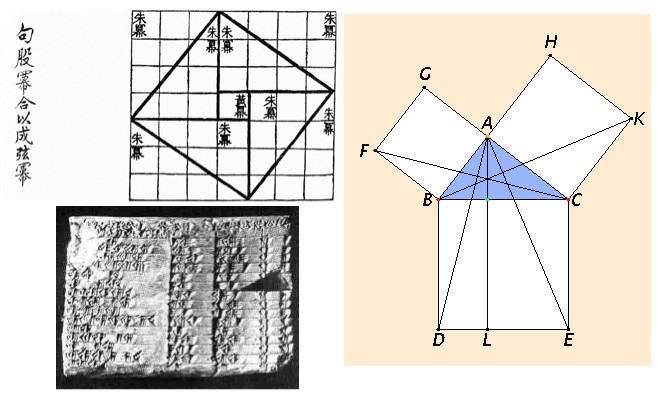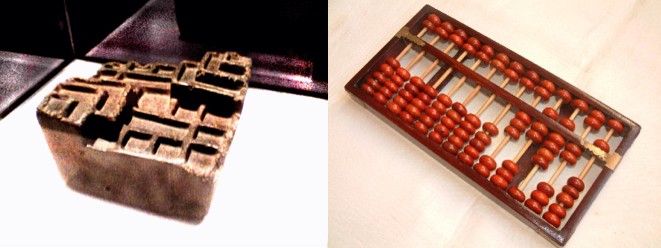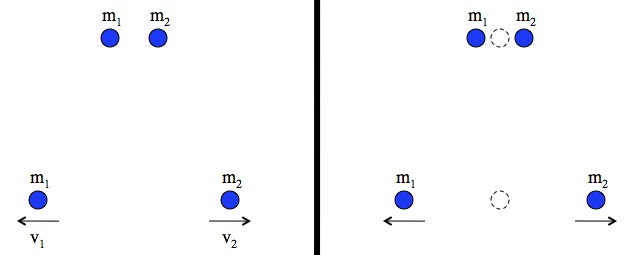Physicist: Similar. We’re sure to have figured out stuff they haven’t, and they’re sure to have figured out stuff we haven’t. But there’s likely to be a fair amount of overlap.
Some things have a way of being figured out over and over. For example, the Pythagorean theorem got itself figured out in China, Greece, India, and Babylonia (Iraq).

Lower left: The Plimpton tablet, which lists Pythagorean triples, is from ancient Babylonia (modern-day Iraq). Upper left: a derivation of the Pythagorean theorem from ancient China (modern-day China). Right: the derivation of the Pythagorean theorem as seen in Euclid's Elements from ancient Greece.
However, there’s a fair chance that old school mathematicians were just copying each other. Specifically, Pythagoras probably stole “his” theorem from the Egyptians (Discoveries aren’t named after the first person to make them, they’re named after the last). Still, it’s the sort of thing that’s so useful and easy to prove that it’s hard to imagine an advanced culture not knowing about it.
And some ideas are just good. We can say it’s very likely that aliens have invented hammers, because people (in every culture), several other varieties of apes, several monkeys species, otters (cutest), and others have all done it. However, being a good idea doesn’t mean that different people/things will create exactly the same thing. For example the Old World (Europe, Africa, Asia) and Incan abacuses are subtly different.

These devices, the Yupana and Abacus, which were developed independently and served the exact same function, have very different forms. (Yupana beads not shown)
Point is, there are almost certainly going to be commonalities. At the same time, things like the Goldbach conjecture (every even number can be expressed as the sum of two primes), or half of the more obscure theorems in the more obscure mathematical disciplines, are unlikely to be in alien textbooks. Math, being an infinite science, is going to have plenty of twists and turns that only one civilization figures out, and many more that none figure out.
Which mathematical things are most likely to be common is the sort of question best left to sci-fi writers, and other experts (such as there are).
Ultimately the physical predictions each of our sciences make will be the same. Because of, you know: reality. Physics is just a mathematical and philosophical structure that describes the universe. What’s very surprising (or, alternatively, very not surprising) is that you can describe (predict) the same physical laws and behaviors based on very different (one might even say; “alien”) premises.
For example, Newton’s first and third laws (“inertia” and “for every action there’s an equal and opposite reaction”) are essentially statements about the conservation of momentum. That is, if you total up the momentum (mass times velocity) of a closed system, then the total momentum remains constant forever. Now, you can mumble something about Lagrangians or reference frames, but when you boil it down, conservation of momentum is just something we take as true (because it always, always works).
But an alien might have a different way of approaching the same set of laws. Rather than saying “for a given system, if you multiply the velocity of each object with the mass of each object and add them all up you get something that never changes” (conservation of momentum), that E.T. might say something like “for a given system, the center of mass never accelerates”. Same laws, different intuition.

Left: Normally we describe Newton's laws in terms of momentum, P = m1 v1 + m2 v2, which never changes. In this case P=0. Right: Another way to describe the same results is in terms of the center of mass never accelerating. In this case the center-of-mass' velocity is zero, and will stay that way. It turns out that, mathematically, these are interchangeable, but the philosophy is a bit different.
Like the abacus/yupana and big-rock/hammer parallels, these different theories do exactly the same thing, but look pretty different.
So (pressed for an answer), I’d expect that no matter how alien an Alien is, whether non-social, immortal, hive-minded, slug-based, whatever, their physics and math has to do a lot of the same stuff ours does, and may even be understandable (to our non-hive minds). At the very least, our physics and Alien physics has to describe the same universe. So, while they may have a completely different approach, it should look familiar, and ultimately do the same stuff.







if we meet aliens, their math may or may not be the same, but their science will be much different from ours- our science will after all have been proven incorrect in a number of important ways (“c”, i’m looking at you…) by the feasibility of such a meeting 🙂
Like us, they still would not have gotten past,ITS turtles all the way down,?
That old womans reply,bears more truth than 100 cern labs.
Is it possible that what we consider non-computable mathematical structures would be computable to an alien lifeform? Does the human sensory perceptual mechanism impose constraints on what we deduce to be computable vs non computable?
It’s not a matter of perception so much as a matter of logic. Even blind, slug aliens would think the same set of problems are computable or not, if they’d discovered the same math that we have.
Maybe you’re assuming they’re physically similar to us? (e.g. living on solid matter, with arms and eyes etc).
What about magnetic aliens that live on the surface of stars? Before you laugh, see what Ian Stewart – mathematics professor at University of Warwick – has to say…
http://www.youtube.com/watch?v=UQA5iawH-wA
The thrust is that the mathematics they discover is probably going to be highly dependent on their environment and physical form. Triangles and counting are central to ours, since we had plenty of solid objects lying around we could use to build the conceptula foundations of our mathematics. Magnetic aliens that live on plasma flows might entirely miss those concepts, but perhaps develop a very advanced fluid mechanics instead, for example.
Their mathematics should be logically consistent with ours (same physical universe), but the translation between ours and theirs might be difficult.
Thoughts?
I would venture the guess that an advanced alien civilization would find our attempts at science and mathematics rather primitive and comical. They would probably find our music to be incomprehensible and pointless noise (yes, also Mozart and Bach…) and would not be able to make head nor tail of the weird human output we call “art”. (Sexuality on the other hand and what it means to us might be most fascinating to them.)
Mathematics of course has a special status among all human endeavor. It’s intellectually our most non-trivial achievement. Yet, aliens are probably very confused by our “mental models” underlying our axiomatic systems (and it is doubtful they will be as preoccupied by “logical consistency” and axiomatics as we are). Especially, the notion of infinite sets will probably appear rather weird to them. Since it’s a completely fictional notion that can not be justified logically or rationally and does not reflect any aspect of reality. Yet our axioms can be easily translated into finite models (I would assume ultrafinitism is the aliens way of doing math, something the human brain can not really cope with). After they have understand our formalism I would think that there will be some of our more nontrivial proofs, logical moves and steps that could be interpreted as a sign of intelligence by them (forget ALL the rest of human activity, literature, science etc.. it is way too trivial and primitive). And then maybe they will not eradicate us. 😉
I think the answer is that their system of mathematics and approach will likely be entirely different. First, of course symbols will be different, if they even use symbols at all. An advanced race may have evolved the ability to do whatever math they need in their heads like a few humans can do. Next, even how they count may be different, using what we would see as a odd base to use. Then, structures like Calculus and geometry are human inventions unlikely to be developed in an Alien culture. I would think that highly developed systems of human thought such as Quantum Field Theory would have no chance of developing even in a similar way in an alien culture.
One can envision a range of thought from no math at all beyond simple counting to complex systems based only on counting or on computational algorithms alone learned by trial and error.
The most one can assume is that general principles such as how numbers add would be the same even though described radically differently.
Would pi be a common principle?
Yes, would they have the idea of Pi, as about 3 units plus one tenth of a unit large, in their own symbol or notation of course? What base would they likely count in? Why would base 10 be more universal, than base 2? We seem to find base 10 easier to work with for arithmetic, but their brains could be faster and base 2 is easy for them.
The laws of nature, and the atoms would certainly be understood in similar ways. Basic atoms are the same all across the universe. How crazy would it be to have some similar notation? What if they have a point, line, radius, and Pi, in their drawings, but in their own language of course? Could their number 3 be like the evolution of ours, with three lines joining into one? The number 1 also a simple line, or the zero a point, or a circle, like a decimal point. Maybe the most universal language and communication will be to draw geometrical shapes and equations. To make full contact by using mathematics.
The universal language will certainly be mathematics and geometry to some degree. All species will share some of it, in common, any time, any place, forever, and especially in drawings. Counting in any unit will be same. There is a 0, then a 00, then a 000, then a 0000, then a 00000, and so on. For them it might be a -, then a –, then a —, then a —-, and so on. No way to avoid this universal truth. The symbols chosen do not matter, as the basic concept is the same. The relation of the diameter and circumference of a circle will certainly be understood universally. Although the base 10 system might not be used, right? Or is it the easiest system? Base 10 certainly works well for humans, day to day, with less brain power, but not for a computer.
How would using a base three system change the way we do science? Would it make more things possible technologically speaking? We have ten fingers so maybe we naturally gravitate towards ten. Let’s say most aliens have three figures. (And please advise any books on the special applications of base three.) Most appreciated.
@Rachel
It would be about the same. How exactly arithmetic is done would be different, but that’s about it.